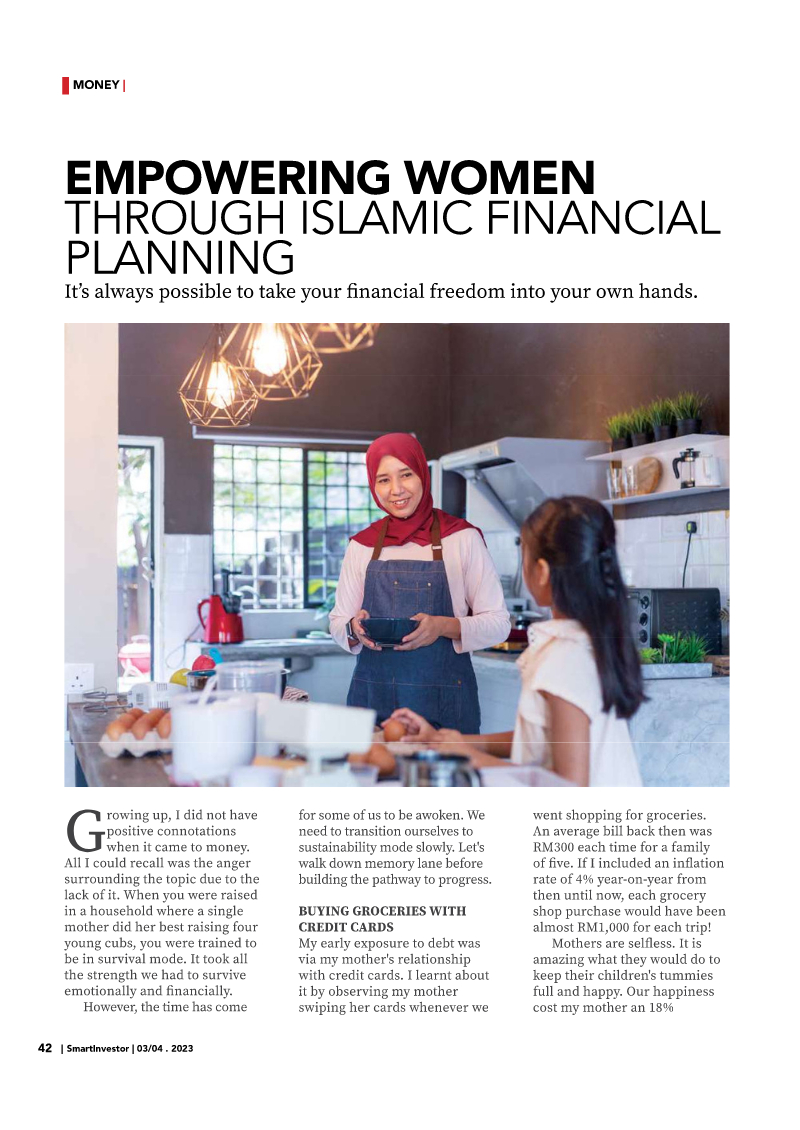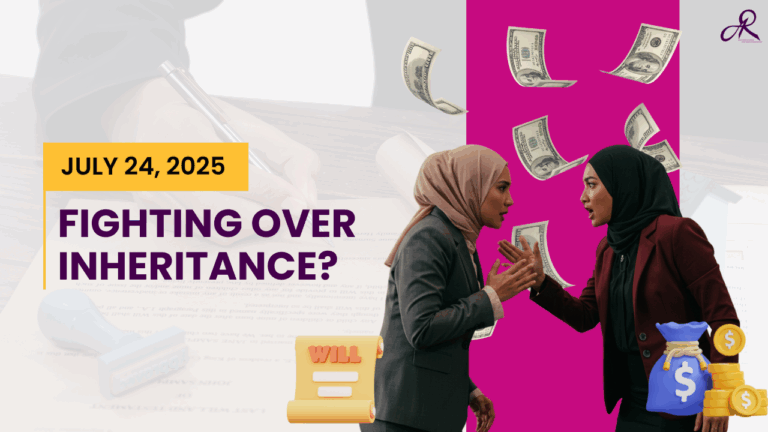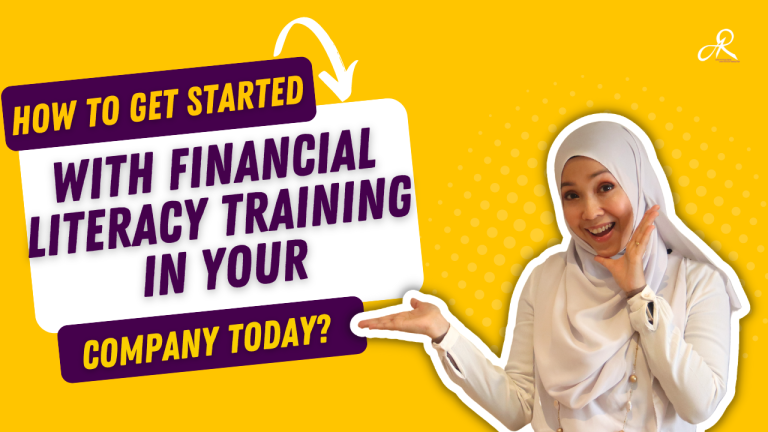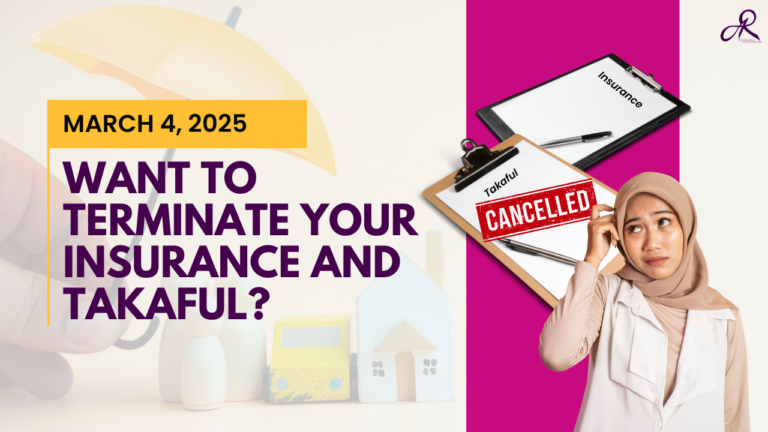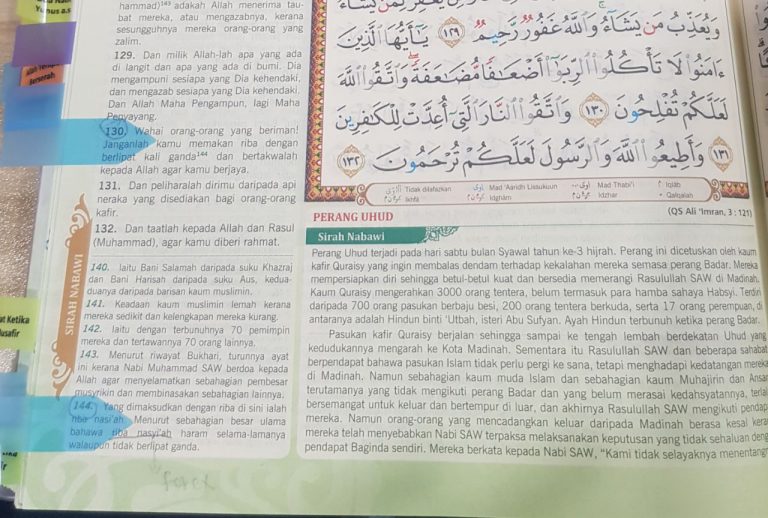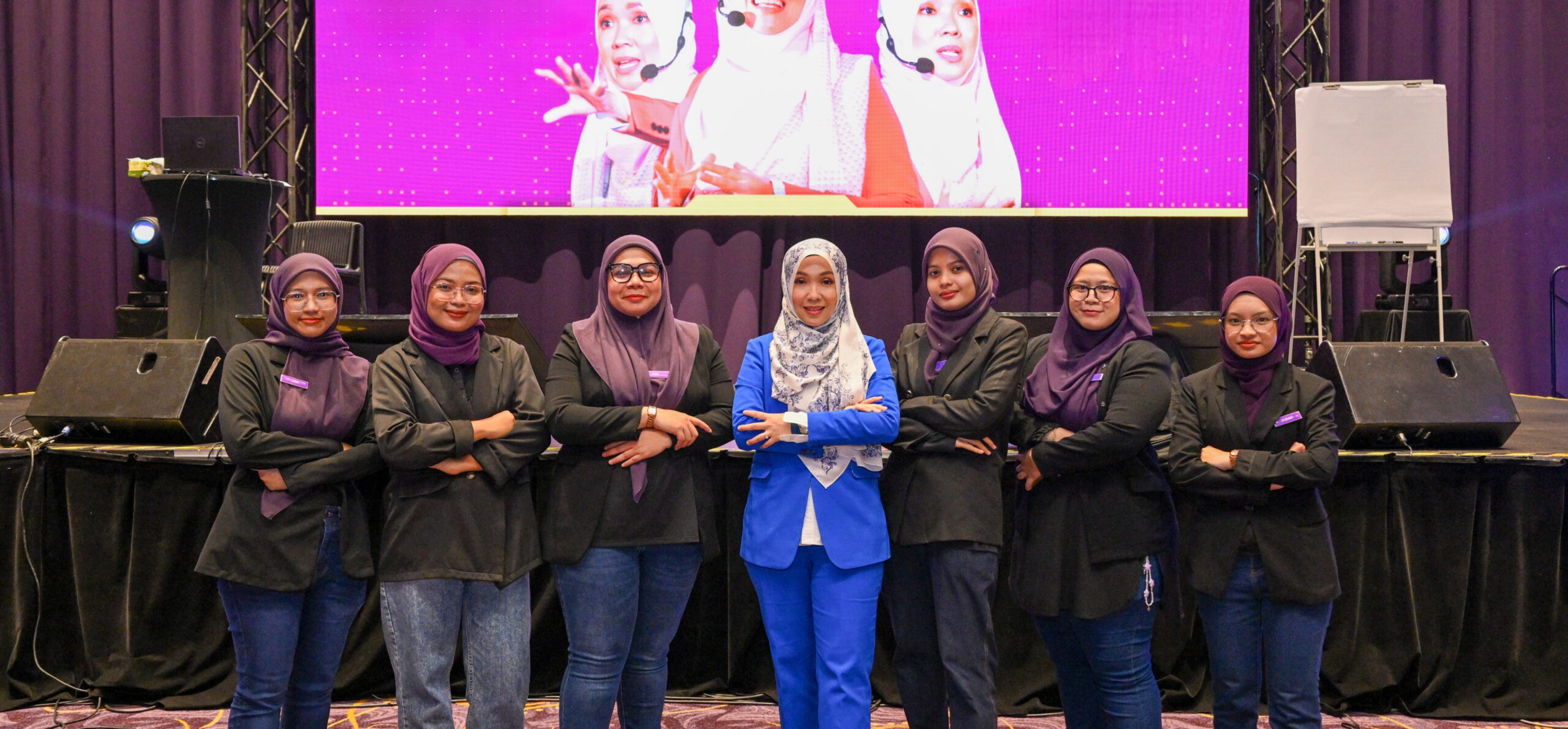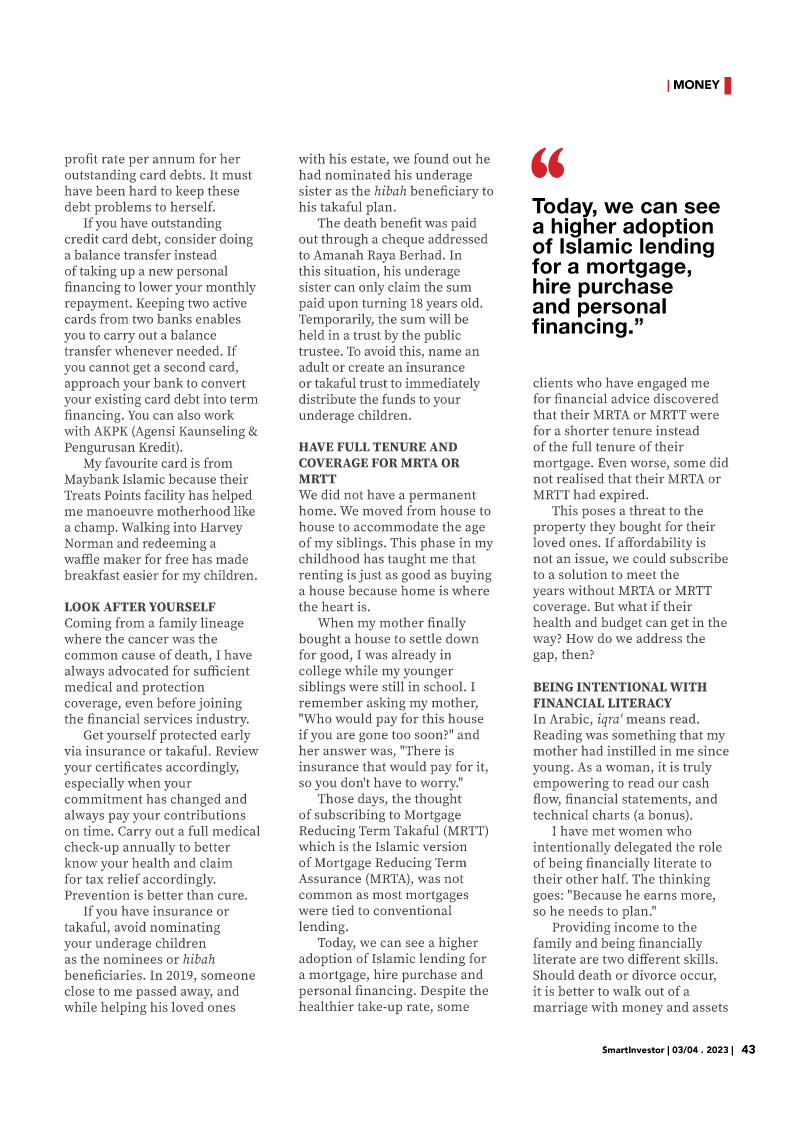
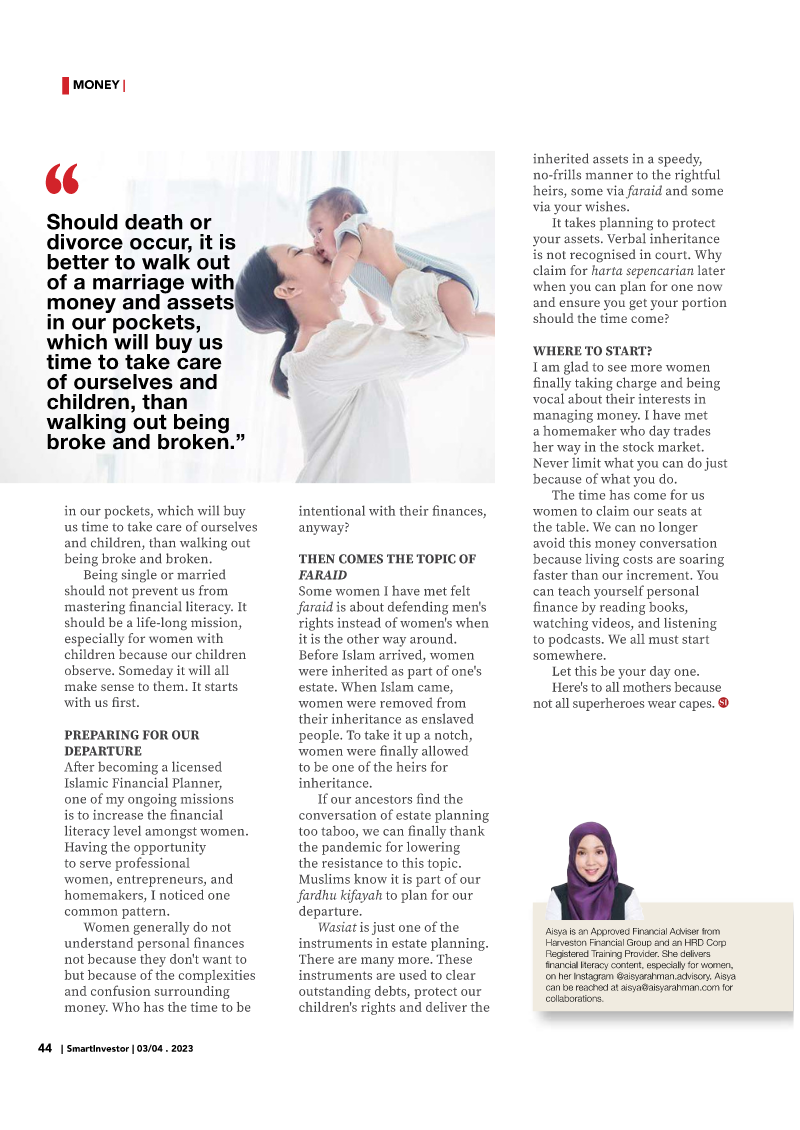
Empowering women through Islamic financial planning.
Growing up, I never had positive recollections of money. All I could recall was the anger surrounding the topic due to the lack of it. When you were raised in a household where a single mother did her best raising four young cubs, you were trained to be in survival mode. It took all the strength we had to survive emotionally and financially.
However, the time has come for some of us to be awoken. We need to slowly transition ourselves to sustainability mode. Let’s take a walk down memory lane, before we build the pathway to progress forward.
Buying groceries with credit cards
My early exposure to the world of debt was via my mother’s relationship with credit cards. I learnt about it through observation of my mother swiping her cards whenever we went out shopping for groceries. An average bill back then was RM300 each time for a five-pax family. If I were to include an inflation rate of 4% year-on-year from then up until now, each grocery session would have been almost RM1,000 for each grocery trip!
Mothers are selfless. It is amazing what they would do to keep their children’s tummy full and happy. Our happiness cost my mother 18% profit rate per annum for her outstanding cards’ debts. It must have been hard to keep these debt problems to herself.
If you have outstanding credit card debt, instead of taking up a new personal financing to lower your monthly repayment, consider doing a balance transfer. It is good to keep two active cards from two separate banks to enable you to carry out a balance transfer whenever you need to. If you are unable to get a second card, then approach your bank to convert your existing card debt into term financing. Your last resort is to work with AKPK.
My favourite card is from Maybank Islamic simply because their Treats Points facility has helped me manoeuvre motherhood like a champ (not a sponsored post, just in case). Being able to walk into Harvey Norman and redeem a waffle maker for free has made breakfast easier for my children.
Look after yourself
Coming from a family lineage where cancer was the common cause of death, I have always been an advocate about having sufficient medical and protection coverage, even before joining the financial services industry.
Get yourself protected early via insurance or takaful. Review your certificates accordingly especially when your commitment has changed and always pay your contributions on time. Carry out a full medical check up annually to get to know your health better and claim for tax relief accordingly. Prevention is better than cure.
If you have insurance or takaful, avoid nominating your under age children as the nominees or hibah beneficiaries. In 2019, someone close to me passed away and while helping his loved ones with his estate, we found out he had nominated his under age sister as the hibah beneficiary to his takaful plan.
The death benefit was paid out in the form of a cheque, addressed to Amanah Raya Berhad. In this situation, his under age sister can only claim the sum paid out upon turning 18. Temporarily, the sum will be held in trust by the public trustee. To avoid this, name an adult or create a takaful trust so that you can distribute the funds to your under age children immediately.
Ensuring you have full tenure and coverage for MRTA or MRTT
We never really had a permanent home. We moved from house to house to accommodate the age my siblings and I were at. This phase in my childhood has taught me that renting is just as good as buying a house, because home is where the heart is.
When my mother finally bought a house to settle down for good, I was already in college while my younger siblings were still in school. I remembered asking my mother, “who would pay for this house if you are gone too soon?” and her answer was “there is an insurance that would pay for it so you don’t have to worry”.
Those days, the thought of subscribing to Mortgage Reducing Term Takaful (MRTT) which is the Islamic version of Mortgage Reducing Term Assurance (MRTA) was not common as most mortgages were tied to conventional lending.
Today, we could see a higher adoption of Islamic lending for mortgage, hire purchase and personal financing. Despite the healthier take-up rate, some clients who have engaged me for financial advisory discovered that their MRTA or MRTT were for a shorter tenure instead of the full tenure of their mortgage. Even worse, some never realised that their MRTA or MRTT had already expired.
This imposes a threat to the property that they have bought for their loved ones. If affordability is not an issue, then we could subscribe to a solution to meet the years without MRTA or MRTT coverage. But what if their health and budget can get in the way, how do we address the gap then?
Being intentional with financial literacy
In Arabic, iqra’ means read. Reading was something that my mother had instilled in me since young. As a woman, it is truly empowering to be able to read our cash flow, financial statements and investment technical charts (a bonus).
I have met women who intentionally delegate the role to be financially literate to their better half.
“Because he earns more, so he needs to plan“.
Providing income to the family and being financially literate are two different skills. Should death or divorce take place, it is still better to walk out of a marriage with money and assets in our pockets, which will buy us time to take care of ourselves and children, than walking out being broke and broken.
Being single or married should not prevent us from mastering financial literacy. It should be a life-long mission, especially for women with children because our children are observing. Someday it will all make sense to them. It starts with us first, ladies.
Preparing for our departure
One of my continuous missions after becoming a Licensed Islamic Financial Planner is to increase the level of financial literacy among women. Having the opportunity to serve professional women, entrepreneurs and homemakers, I noticed one common pattern.
Women in general do not understand personal finances not because they don’t want to, but simply because of the complexities and confusions surrounding money. Who has the time to be intentional with their finances, anyway?
Then comes the topic of faraid
Some women that I have met felt faraid is about defending men’s rights instead of women, when it is actually the other way around. Before Islam arrived, women were inherited as part of one’s estate. When Islam came, women were removed from one’s inheritance and as slaves. To take it up a notch, women were finally allowed to be one of the heirs for inheritance (Surah Al-Nisa, v7, 8, 11 and 12).
If our ancestors find the conversation of estate planning a taboo, we can finally thank the pandemic for lowering the resistance to this topic. For Muslims, know that it is part of our fardhu kifayah to plan for our departure (Surah Al Baqarah, v180, 240, 280 and 282).
Wasiat is just one of the instruments in estate planning. There are many more. These instruments are used to clear outstanding debts, protect our children’s rights and deliver the inherited assets in a speedy, no frills manner to the rightful heirs, some via faraid and some via your wishes.
It takes intentional planning to protect your assets from certain Cruella Devil, if you know what I mean. The point here is to plan. Verbal inheritance is not recognised in court. Why claim for harta sepencarian later, when you can plan for one now and ensure you get your portion should the time come?
Empowering women through Islamic financial planning
I am glad to see more women are finally taking charge and being vocal about their interests in managing money. I have met a homemaker who day trades her way in the stock market. Never limit what you can do just because of what you do.
The time has come for us women to claim our seat at the table. We can no longer avoid this money conversation because the cost of living is soaring faster than our increment. You can teach yourself personal finance by reading books, watching videos and listening to podcasts. You can also work with professionals like me. We all have to start somewhere.
Let this be your day one.
Here’s to all mothers, because not all superheros wear capes.
This article was written by Aisya Rahman and published in Smart Investor’s magazine, March to April 2023 publication. Aisya is an Approved Financial Adviser from Harveston Financial Group and an HRD Corp Registered Training Provider. She is passionate about empowering women through Islamic financial planning on her Instagram @aisyarahman.advisory.

